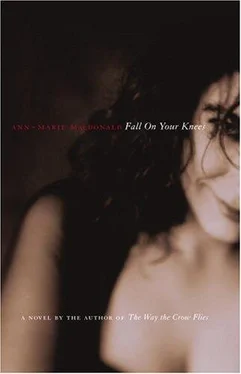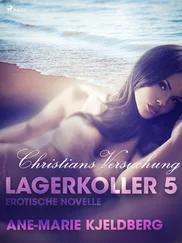Still people poured in, filling up the streets that ran north-south, and the avenues that ran east-west, every second one named for a Catholic saint or a coal company magnate. Boom Town. It didn’t exist officially and it had no name yet, but the Piper house was suddenly on a street and the street had a name: Water Street.
Materia hadn’t been in a church since she’d got married. Now that there was a Catholic church right handy there was no reason she couldn’t just walk over. But she felt unworthy. Our Lady had not answered her prayer. Materia still did not love her child, and she knew the fault lay within herself,
“Kathleen, taa’i la hown.”
Materia sat the child on her lap and wrapped her arms around it. She sang, unrepeatable and undulating:
“Kahn aa’ndi aa’sfoor
zarif u ghandoor
rasu aHmar, shaa’ru asfar
bas aa’yunu sood
sood metlel leyl …. ”
Materia rocked the child and felt sad — was that closer to love? She hoped. The child felt cool in her arms. “I’ll warm you,” she thought. And kept singing. Kathleen stayed perfectly still, pressed close up against the rolling mass. Materia stroked the fire-gold hair and passed a warm brown hand across the staring green eyes. Kathleen tried not to breathe. Tried not to understand the song. She tried to think of Daddy and light things — fresh air, and green grass — she worried that Daddy would know. And be hurt. There was a smell.
Materia released the child. It was no good. God could see past Materia’s actions, into her heart. And her heart was empty.
Materia no longer went up to the hope chest to cry — she cried wherever she happened to be at the time — nor did it any longer interrupt her work or wrench a single muscle in her face.
“Give us a jawbreaker and a couple of honeymoons,” said James.
MacIsaac’s Drugs and Confectionery smelt of new pine, bitter herbs and salt-water taffy. Mr MacIsaac reached into a tilted jar brimming with the edible rainbow. Behind him stretched shelf upon shelf of bottles and packets containing powders, essences, oils and unguents. Whatever ails you.
Mr MacIssac handed Kathleen a sarsaparilla candy cane as an extra little treat, but she hesitated and looked at James, who said, “It’s all right, my darling, Mr MacIsaac’s not a stranger.”
Mr MacIsaac looked at Kathleen gravely, lowered his head and said, “Go on, touch it.”
She touched his billiard-bald head and grinned. Mr MacIsaac said, “I hear you got a set o’ lungs on you, lass.”
She nodded wisely, sucking on the candy cane. MacIsaac laughed and James beamed. He and Kathleen left the shop together. Mrs MacIsaac said from her perch on the sliding ladder, “She’s beautiful.”
“Yuh, she’s a pretty little thing.”
“Too pretty. They’ll never raise her.”
Mrs MacIsaac watched the shop while Mr MacIsaac limped back to his greenhouse for a drop of “the good spirit”. He’d been in the Boer War.
At home, Materia stood at the counter rolling out dough for a pie — steak and kidney like James’s mother used to make — and finally twigged to a thing that had been nagging her all along. It was this: Kathleen’s baptism hadn’t taken. It had been done by a Prostestant minister. The child needed to be properly baptized, in Latin, by a Catholic priest. And then everything would be all right. She told James when he arrived home with the girl but he said, “Kathleen has been baptized. It was done by a man of the cloth, a Christian man, and that’s all there is to it.”
Kathleen’s cheeks bulged with hard candy, her green gaze directed up at her mother. She didn’t look all that baptized to Materia.
James had taught his daughter to read words soon after she learned to read music. At three and a half she’d shared his lap with a terrifyingly illustrated book more than half her size and sounded out, “‘In the midway of this our mortal life, I found me in a gloomy wood, astray….’” He’d started her on Latin when she was five, teaching himself at the same time — it would help with her Italian singing. He ordered another box of books. Children’s classics this time, and they read them aloud, taking turns.
He hadn’t much time for his own reading, though his books now numbered twenty-three not counting the Encyclopaedia Britannica — “Read that end to end,” thought James, as he gazed at his glass cabinet, “and you’d know just about everything. Go anywhere at all.”
At the local schoolhouse Kathleen learned to sit in rows and not to gawk at those less fortunate, but little else. The lady teacher got the creeps from the porcelain girl with the mermaid eyes. The child seemed to be in disguise. Staring up at a corner of the ceiling or out the window, waiting for something, a sign — what? — yet always ready with the answer: “Wolfe died on the Plains of Abraham, miss.” Hands folded on the desk, spine straight. “The square of the hypotenuse is equal to the sum of the other two sides, miss.” Every feature formed to preternatural perfection. “It’s i before e except after c, miss.” It wasn’t right in a child. Perhaps she wasn’t a child at all.
In the schoolyard Kathleen came alive but in the oddest way, showing an alarming tendency to play with boys. Hurling sootballs, schoolbag raised as a shield, shrieking with joy in her linen sailor dress, ringlets flying, for ever banishing herself from the society of girls.
Blackened knees and torn silk were the stuff of high spirits, and James never scolded her for ruining her clothes, but when Kathleen came home and said, “Pius MacGillicuddy gots a finger in a jar what his da found in the mine, that he b’ought up from a wee tiny sprout,” it was time to send her to Holy Angels in Sydney.
The Sisters of the Congregation of Notre Dame were in the business of educating the whole girl: from grammar to botany, physics to French. But above all, Holy Angels offered an excellent music program. James had been going to wait a few years, till Kathleen turned twelve and he’d saved enough for tuition, but there was no help for it, she’d be tarnished by then. He’d find the money.
He started a garden in the backyard on the far side of the creek. He bought a new old horse and cart. He travelled across the island to the Margaree and collected topsoil with no trace of coal-dust. The missus would have to learn to make soap, butter and her own clothes. From now on they’d have to pay only for meat, and Benny always gave them a special price. Benny gave James a special price on manure too.
“For you, free. That’s kosher cow shit, mind you, you’re going to have kosher carrots and potatoes, you’ll be a Jew in no time — you want, I’ll throw in a circumcision, no charge.”
James went out to the woods and cut down a young apple tree. Stripped it of branches, sharpened it at both ends and drove it into the centre of the garden. Nailed a plank of driftwood across it, and dressed it in one of Materia’s old frocks that she’d grown out of and a fedora he found blowing over a field. It wasn’t effective till he fashioned a head and torso from two flour sacks stuffed with straw to fill out the clothes, and impaled them on the stake. Every so often he changed its attire, now a dress, now a pair of trousers, but always the hat, keeping the birds on edge.
“Kathleen, come.”
Materia no longer spoke Arabic to the girl. What for? Kathleen followed her mother into the kitchen. The big tin tub was full and steaming. Tomorrow was Kathleen’s first day at Holy Angels and James wanted her spick and span. That meant hair. Materia used to dread washing the child’s hair because of all the fuss. James would holler from outside the kitchen door, “Are you trying to kill the poor child?” But Materia was used to the girl’s hysterics, and performed the task briskly, scouring the scalp, dunking the head, wringing the tresses, getting the comb through, keeping her still. James could holler, but he would never intrude on his daughter’s ablutions.
Читать дальше












